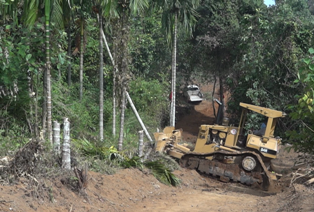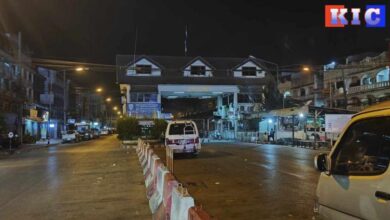Burma: Investors beware?

Despite the lifting of sanctions, experts predict that Burma’s long-term economic outlook is full of risks for potential investors, as military-linked companies continue to hold sway over the economy.
It is boom time for Burma. The impoverished but resource rich country, once isolated under a military dictatorship, has seen a series of political reforms under its President U Thien Sien that have led to the lifting of international sanctions and $5.9 billion in foreign debt written-off – a move designed to allow large amounts of new government lending.
But, economists warn that there are signs that Burma’s economic revival could be threatened by unresolved ethnic tensions, endemic government corruption and a bitter civil war in Kachin State.
“Bright spot” or economic blackhole?
Burma’s economy is a “bright spot” in Asia, according to the World Bank’s East Asia and Pacific Economic Update released in December 2012, with accelerating GDP growth of 5.5 percent in 2011-2012, with 6.3 percent predicted for 2012-2013. Tourism is also picking up, with over 800,000 visitors arriving in Burma in 2011, according to the Ministry of Hotels and Tourism, up 3% from 2010.
Regional analysts have been quick to praise the reforms taking place in Burma, but as Sydney based Professor Sean Turnell explained, fundamental issues that have yet to be addressed by President Thein Sein still put long-term economic stability at risk. “The narrative of reform starts to unravel when you begin to seriously look at what Burma’s government has done so far. Import licensing, producing crops and restrictions on banks are still more or less in place,” Turnell, a professor of economics at Macquarie University in Sydney Australia, added, “The conception of the country’s economy is seen as the same as the conception of the military…. it’s a bloated apparatus.”
Turnell, who has authored book on Burma’s financial and monetary system – Banks, Moneylenders and Microfinance in Burma – said that Burma’s government must combat endemic corruption by opening up vast swathes of the country’s economy to private ownership.
“Corruption has flourished because the State is so interventionist. Everything needs government approval, it’s a breeding ground for corruption.”
International financial institutions, such as the World Bank, may laud Burma’s economic growth, but as Turnell warns figures can be misleading, “despite the rhetoric there is not much longer term investment yet at all. It’s just been quick returns, like tourism and resources, but not longer-term infrastructure. It’s essentially still a subsistence level economy.” The World Bank’s report noted similar concerns for Burma’s economic trajectory, “there are risks to the macroeconomic program that could emanate from events on the political front,” and with an ongoing conflict in Kachin State, and the displacement of the Muslim ethnic minority Rohingya, the risks for investors are considerable.
The dominant concerns for investors, according to the World Bank, were, “the emergence of alliances of vested interests seeking to disrupt the reform process and the prospect of escalation in internal strife in some of the border areas and resumption of conflict where ceasefire agreements have been signed.”
The Paris Club
Meanwhile, human rights advocates have criticised the decision by the ‘Paris Club’ of creditor countries decision to give Burma an amnesty on nearly $6 billion in state debt, saying that international community should exert more pressure on Burma over it’s military offensive in Kachin State. The Paris Club includes affluent democracies Japan and Norway.
Since December the Burma has employed helicopter gunships, jets and heavy artillery bombardment, leading to civilian deaths.
Anna Roberts, Executive Director at Burma Campaign UK, was critical of the controversial decision, “it is incredible that Burma gets billions of dollars of debt relief when its biggest spending is on the military, an army that is committing crimes against humanity in its war against ethnic minorities.”
“Chronic State Failure”
Human Rights Watch also condemned Burma’s current human rights situation in its World Report 2013. “Burma’s reforms over the past year are hindered, not helped, by international oversell and hasty praise in the face of continued serious human rights abuses,” said Phil Robertson, deputy Asia director at Human Rights Watch.
“Burma is still failing basic rights tests on its remaining political prisoners, blocked humanitarian aid, and ensuring accountability for war crimes,” he added.
Yet in spite of international outrage, powerful foreign governments – including as the UK and the U.S. – have continued to ease sanctions and open up the Burma’s economy to more overseas investment.
“The US, UK, and other influential governments should hold Burma to the human rights commitments it made during last year’s well-publicized international visits,” Robertson said. “Foreign governments should recognize that Burma’s history shows that a tough response to rights abuses doesn’t derail reform, but promotes it.”
*Saw Wei Thoo is a Karen News Journalist and Henry Zwartz is a Karen News intern.




